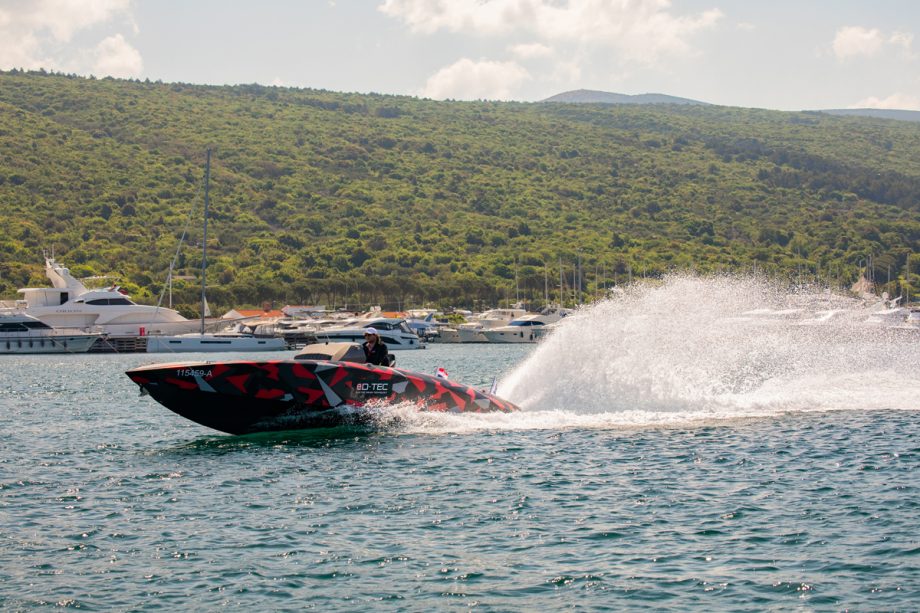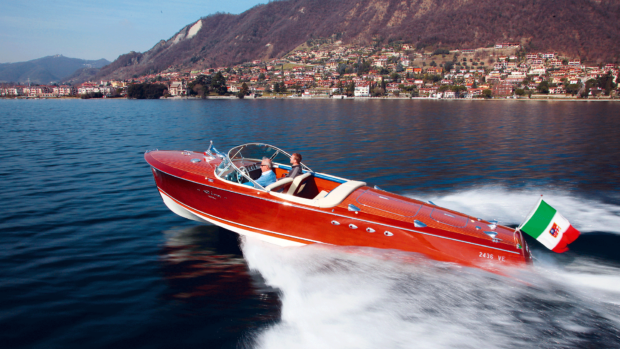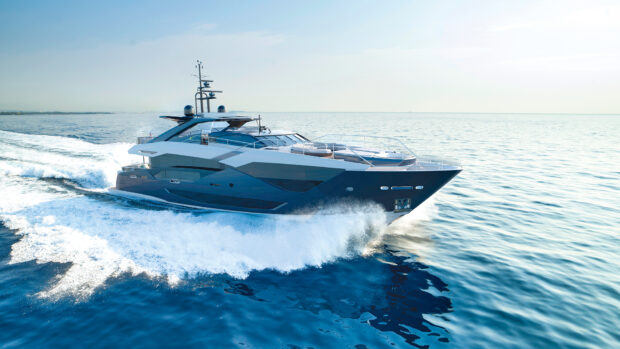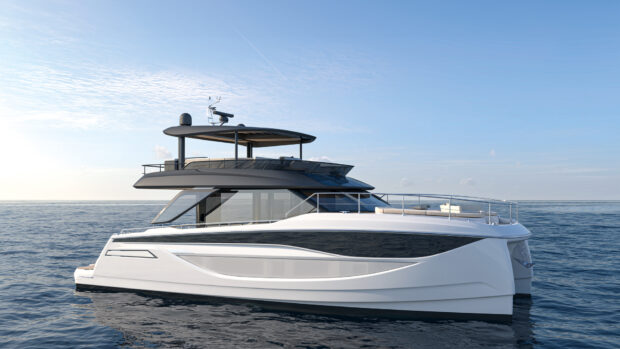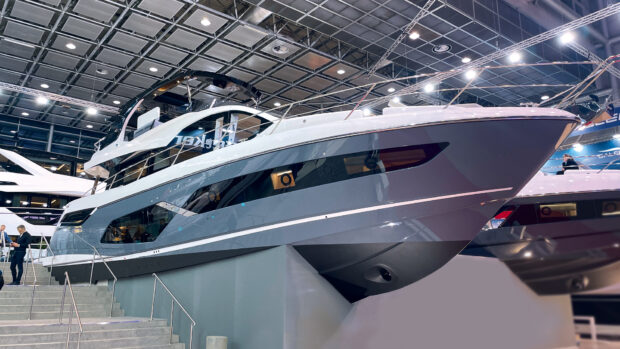A new all-electric surface drive system called the eD-QDrive 1 could deliver unparalleled speed, range and ease of installation…
Until now only a handful of specialist yards have attempted to build electric boats. The difficulty of trying to source the right components, package them into a suitable hull and get it all working seamlessly while delivering the speed and range that customers demand at a price they can afford has simply proved too challenging.
Now a German start-up is hoping to simplify the process with a complete plug-and-play electric drivetrain that promises major gains in speed, efficiency and range. The first craft with this new system, a foil-assisted 8.6m powercat, is said to have a top speed of 60 knots and a cruising range of 70nm at 30 knots.
The key to its performance is a pair of eD-TEC’s new all-electric surface drives. Founded by the Volkswagen Group’s former chief strategy officer, Michael Jost, eD-TEC’s mission is to smooth the boatbuilding industry’s transition from fossil fuels to electric using learnings from the automotive market. That means developing a robust, reliable drivetrain that’s easy to install, operate and maintain.
Surface piercing
To minimise drag, the development team settled on a surface drive setup with its own integrated gearbox and electric motor. This entire unit is designed to slot straight into a templated transom cut-out and bolted into place from the outside.
With its surface-piercing propeller set inside a composite housing and framed by a pair of small rudders, it makes for an unusually compact and lightweight drivetrain that weighs under 100kg and measures 1,365mm x 860mm x 504mm.
Article continues below…

This ground-breaking water jet could jump-start the electric boats revolution

Are electric boats finally catching up to cars? Torqeedo Deep Blue 100i 2500 makes us wonder…
It’s simple to install and the design is said to deliver the speed and efficiency of a surface drive setup with the manoeuvrability and simplicity of a shaftdrive one. It even has a pair of small horizontal fins on either side of the housing that pivot up and down like the diving planes on a submarine to adjust the trim angle.
Cooling of the motor and battery is taken care of by a fully integrated system with a raw water pick-up and outlet built into the surface drive’s external housing to avoid the need for any additional through-hull hoses or seacocks.
A titanium heat exchanger has been engineered to minimise corrosion issues while sensors for temperature, humidity and vibration monitor the key parameters and help predict potential issues before they become a problem.

Plug-and-play drive system slots into a transom cut-out
The power of 1
The first of these new electric drives, the eD-QDrive 1, has a continuous output of 100kW (135hp) and a peak output of 200kW (270hp), allowing it to deliver short bursts of full power acceleration to get on the plane before settling back to a constant cruising speed of 30 knots.
Power comes from eD-TEC’s own stackable 80kWh high voltage battery pack, allowing boatbuilders to add extra units as needed. A purpose-built control box with cloud-based connectivity and artificial intelligence controls the fly-by-wire throttle, steering and trim angle and allows for future software updates.
Designed for 6-10m vessels in single or multiple applications, the eD-QDrive 1 is being marketed as a direct replacement for outboard or sterndrive combustion engines. However, the whole package is designed to be scalable, with 200kW, 400kW and 600kW drivetrains planned, making it suitable for boats up to 24m.

Speed 28 RIB will use twin eD-QDrives for a top speed of 60 knots
Although pricing and delivery times have not yet been announced, Silent Yachts is already pressing ahead with development of a new Speed 28 powercat RIB featuring a pair of these new eD-QDrives. Foils between the hulls reduce the wetted surface even further, allowing for that impressive claimed top speed of 60 knots.
A 150kW DC charger should keep charging times down to less than an hour where available, while overnight charging via a standard AC shorepower is also possible. It even has a carbon fibre hardtop with built-in solar panels to top up the batteries under way and at rest.
How well this new drive system works in practice will only become apparent when we get a chance to sea trial one. Traditional surface drives tend to be notoriously difficult to manoeuvre around a marina due to the lack of bite from the surface-piercing propellers and the small size of the rudders, especially when going astern.
It also remains to be seen whether both the drives and the boat can be brought to market at a price that will tempt buyers away from more traditional outboard or sterndrive-powered rivals. However, with big names like Michael Jost and Silent Yachts behind the project, they certainly have the credibility to succeed.
First published in the April 2023 issue of MBY.
June 2023 update: The prototype eD-QDrive 1 has completed 190nm of testing, clocking a top speed of 40 knots along the way.
“Our aim is to reach 50 knots with the monohull, and we haven’t used all the capacity of the batteries and motors yet,” said Marc Jost, eD-TEC’s Chief Strategy Officer.
“This was because at that stage we were still optimising the software so we stayed on the safe side so as not to damage any components – but we still made 40 knots at lower power and with that we are actually rather happy!”
If you enjoyed this…
Be first to all the latest boats, gadgets, cruising ideas, buying advice and readers’ adventures with a subscription to Motor Boat & Yachting. Available in both print and digital formats, our monthly magazine will be sent directly to your home or device at a substantial discount to the usual cover price. See our latest offers and save at least 30% off the cover price.

Twin rudders improve manoeuvrability at slow speeds

eD-TEC will supply the whole system including drives, batteries, control unit and solar panel

The stackable high voltage battery












